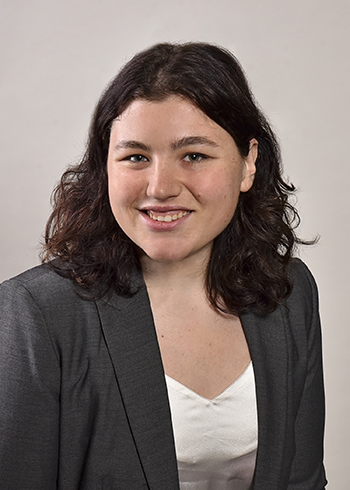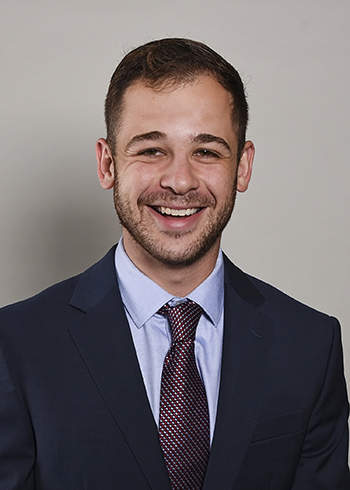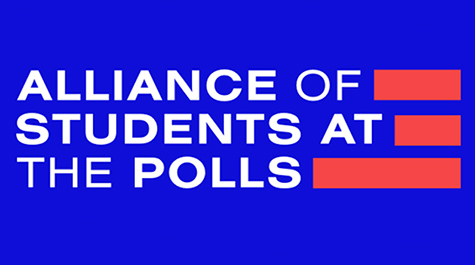William & Mary Law’s ASAP Gets Law Students to the Polls ASAP
If there’s an urgent ring to the name of William & Mary Law School’s new student organization, ASAP, it’s deliberate. With a contentious national election coming up fast, and with endless headlines about problems at the polls during the primaries, students knew that help was needed as soon as possible.
And thus ASAP—the Alliance of Students at the Polls—was born.
Co-founded by Elizabeth DePatie ’22, Max Weiss ’22 and Allen Coon ’22 under the supervision of Professor Rebecca Green, ASAP is a response to understaffed polling locations during the primaries due to the threat of the COVID-19 pandemic.
Indeed, DePatie describes the group’s mission in terms of a medical response. Watching the news, she and fellow students in William & Mary Law School’s Election Law Society noted how med students were heeding the call as the pandemic unfolded.
“We saw an opportunity for law students to also step up and address urgent needs of the democratic process,” DePatie says. “The idea was to organize a national network of law students to recruit young people—less vulnerable to complications from COVID-19—to work the polls in November.”
The primaries were a wake up call. Polling locations were closed for lack of available poll workers who are usually from the older generation. As a consequence, some cities had only a few open polling locations.
“We saw an opportunity for law students to step up and address the poll worker shortage during the primaries. We didn’t want to see a repeat in the general election where polling locations might be closed or unsafe because they didn’t have enough workers,” DePatie says.
Though the focus of ASAP is to organize law students nationwide to address these concerns, they hit close to home, too. Concerned about voting in the Williamsburg-James City County area, Max Weiss, co-president of ASAP, signed up to work the polls locally. When he also encouraged friends to send in applications, he was delighted to discover that they were not needed.
“I spoke with the county election official in charge of recruiting poll workers who said they have 200 new poll workers this year and don’t need more, which is a record. This is consistent with headlines nationally that Americans are stepping forward to perform this important service,” Weiss says. “But there’s a lot of work to be done, particularly in urban centers like Milwaukee or Atlanta; it’s nice to see the Atlanta Hawks open up their stadium for voters.”
As can be imagined, a typical work week for students interested in election law gets intense as the election approaches. In addition to his law classes, work with ASAP, and serving as co-president of the Election Law Society with DePatie, Weiss works for Ellen Weintraub, Commissioner of the Federal Election Commission (FEC).
“As long as I’m hitting those top three things—classes, FEC and ELS/ASAP—every day, I can sleep okay at night,” Weiss says. “Not to mention that it’s time to get started on getting my 2L summer job search.”
For her part, DePatie admits that a number of color-coded calendars come in handy every Monday morning.
“I’m fortunate in that everything I’m involved in is something I’m passionate about, so I’m willing to carve out the time for it during the week.”
She also credits fellow students’ strong commitment to teamwork with making things easier for everyone in the Election Law Program and ASAP.
“Once the year started, we were able to get a really good team on our side. First years Peter Quinn and Mike Bellis have been amazing leaders despite the work all taking place remotely. We can work together and coordinate and parse out the work, but there’s definitely a lot of trying to keep the big picture in mind,” DePatie says.
Both DePatie and Weiss came to William & Mary with a strong interest in politics. And the Election Law Program co-directed by Professor Green really sold it to them.
“I was starting to have this budding interest in politics in a way where I could personally have an impact,” DePatie says. “The Election Law Program at William & Mary is, in my opinion, easily the strongest in the country, not just in terms of the breadth of what you can learn but in terms of the breadth of what we actually try to do.”
Weiss gets a sense of that breadth when he finds himself fielding calls from news organizations across the country.
“We’ve done our best to reach out to news organizations to add to the drumbeat on the need for a new generation of poll workers. Last week I talked with The Center for Public Integrity; the week before that I talked with Business Insider,” Weiss says. “I’ve had a couple of interviews that were featured in articles published in Newsweek and NPR. It’s been a great way to help get word out about ASAP and this important issue.”
Aside from working the polls, ASAP also sees law students playing a critical role in assisting with post-election administration. Counting tables (and perhaps recounting tables) need to be staffed. ASAP’s law student network around the country is ready to mobilize if shortages in post-election worker staffing arise.
Even beyond the current cycle, students in ASAP plan for the organization to play a permanent role. The need for the next generation of civic-minded poll workers did not start with 2020 and will not end with it.
“We want ASAP to last; we want it to be an organization that continues and goes forward,” DePatie says. “This would involve organizing and growing our network of law students to help out during and after future elections, and also continuing to increase general public knowledge about the importance of poll work and poll observation.”
ASAP students are delighted to be a part of this movement nationwide. More and more, they find themselves teaming up with other organizations around the country doing similar work and seeing tangible results.
“There’s nothing I like better than getting text messages from people in Georgia who signed up because of us,” DePatie says.
“We see the seeds of an expanding role for law students in helping administer the democratic process; we are primed to help,” Weiss adds.
About William & Mary Law School
Thomas Jefferson founded William & Mary Law School in 1779 to train leaders for the new nation. Now in its third century, America's oldest law school continues its historic mission of educating citizen lawyers who are prepared both to lead and to serve.
